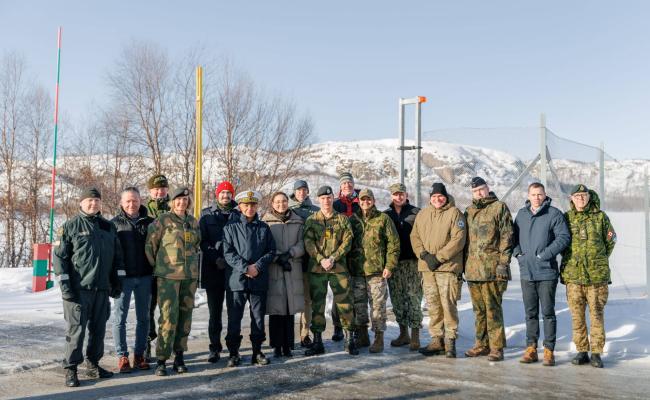EU Visit to the Norwegian-Russian Border: “A Threat in This Region Is a Threat to European Security"

The delegation from the EU Committee on Security and Defense visiting Kirkenes. It included parliamentarians from Germany, France, Spain, Croatia, and Greece. (Photo: Delegation of the European Union to Norway)
A delegation from the EU Parliament's Committee on Security and Defense recently visited the Norwegian border town of Kirkenes to gain insights into the hybrid threat landscape. The committee chair emphasizes that the border with Russia is also the EU's Schengen border and that the threats in the North are a European matter.
Six members of the European Parliament's Committee on Security and Defense visited Kirkenes in Northern Norway at the end of May.
At the Norwegian-Russian border, they were briefed on the increasing number of Russian hybrid attacks by the Norwegian Police Security Service. They also met with the Mayor of Sør-Varanger municipality, Magnus Mæland (Conservatives), while in the border town.
"The EU parliamentarians wanted insights into the security situation in the North, as well as knowledge about the Arctic and Kirkenes as a geopolitical hotspot. I was clear that we disregard authoritarian and totalitarian regimes such as Russia and China, and want closer cooperation with the EU and NATO," says Mæland to HNN and continued:
"My main message to the EU delegation concerned the necessity of reinforcing civil society to strengthen preparedness and defense in the face of the threat landscape. In that context, I emphasized the Syd-Varanger mine, which constitutes an essential economic foundation in this border area."
"We believe that iron ore of high quality should be considered a critical mineral, and want the Syd-Varanger mine to be given status as a strategically important project to the EU, as Nussir's copper mine in Hammerfest did on Wednesday. This will strengthen European industrial autonomy and secure investments in Sør-Varanger."

In front of Sør-Varanger Town Hall: Nikolaos Farantouris (GUE/NGL, Greece), Committee Chair Marie-Agnes Strack-Zimmermann (Germany, FDP), Sør-Varanger Mayor Magnus Mæland, Nicolás Pascual de la Parte (EPP, Spain), Christophe Gomart (EPP, France). (Photo: Delegation of the European Union to Norway)
A shared threat
The delegation was led by the Chair of the Committee, Marie-Agnes Strack-Zimmermann.
“Russia is an everyday threat in this corner of Europe through its hybrid war and military posturing," she says after the Kirkenes visit and continues:
"We have seen first-hand Russia’s efforts to undermine border communities. Let us not forget, Norway’s northern border is also the EU’s Schengen border, a threat in this region is a threat to security in the rest of Europe too."
"Only by working closer together with our partners, like Norway, can we stop Russian attacks on our European way of life. This includes boosting our defense industries and developing technologies to stop aggressors. Doing this can also mean jobs, growth and new opportunities in outlying regions."
Also read (the article continues):
To be continued
The entire delegation also expressed commitment to countering security threats in the High North, according to a press release from the EU Parliament.
"The members of the European Parliament could clearly see that Norway is not just a critical partner to the EU in strengthening European defense and the European pillar in NATO, but also a frontline partner facing hostile geopolitical realities at the border with Russia," the press release also reads.
Mayor Mæland adds that the dialogue with EU parliamentarians will continue.
"They signaled that they wanted visits from Sør-Varanger to Brussels to keep discussing, and we will follow up the conversations in Kirkenes with the Mission of Norway to the European Union," he says.
Composite visit
Ahead of their visit to the North, the EU Parliament delegates went to Oslo to meet with the Standing Committee on Foreign Affairs and Defence in the Norwegian parliament. They also met with a state secretary in the Norwegian Ministry of Defense and were briefed by officials on security and intelligence.
The primary purpose of the visit to Norway was to gain insight into Russian activities and threats in the North Atlantic and on Europe's northeast flank.
The aim was also to strengthen dialogue on further cooperation between the EU and Norway within NATO, as well as on continued military aid to Ukraine. Increased cooperation in the defense industry was also on the agenda.
Norway and the EU entered into an agreement on defense and security policy cooperation in May 2024.





